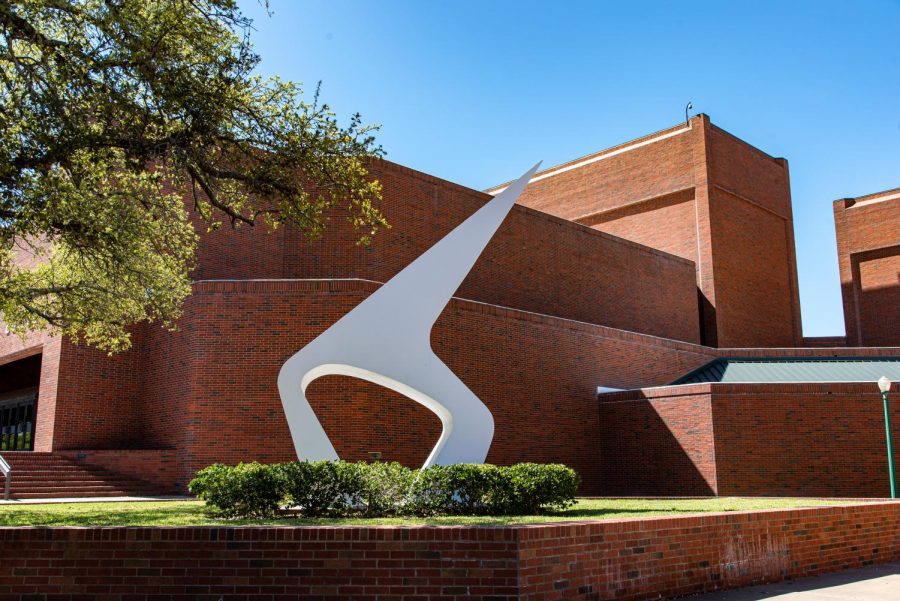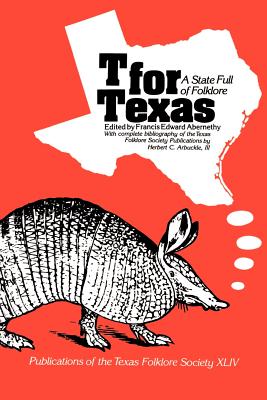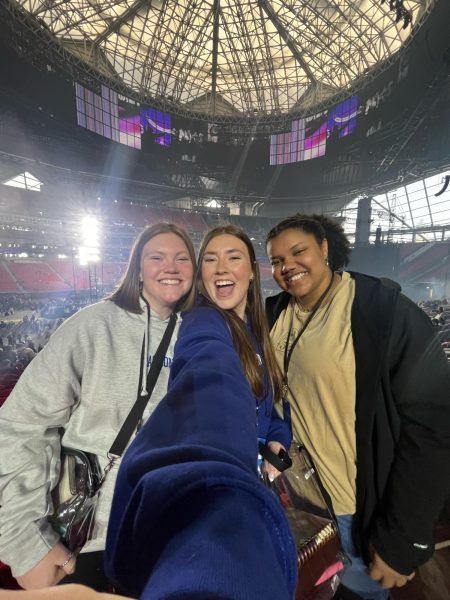Diving into queer experiences with slam poetry
The ULTRA statue located outside of the Clyde H. Wells Fine Arts building.
On Oct. 7, 2020, Tarleton’s Office of Diversity, Inclusion and International Programs (ODIIP), will host one of their monthly diversity dialogues.
The event will be hosted in the Barry B. Thompson Student Center, in room 27, at noon. This event is coordinated by one of Tarleton’s student specialists, Emily VanKirk. This month’s diversity dialogue topic will be slam poetry.
“Queer folks can celebrate their queerness via their poetry,” VanKirk said.
Slam Poetry is an art form that has been around since the 1980’s and is considered to be a form of expressive art. Expressive art is use by an artist to convey their emotions about any topic that they wish.
“We’re going to relate slam poetry to queerness and queer experiences. Slam poetry isn’t necessarily adherent to queer [culture] but it is an expressive art form. In a lot of cases people use expressive art forms as a way to celebrate and uplift pieces of their identities, “VanKirk said.
The inspiration for this month’s diversity dialogue came from a conference that some ODIIP members and students attended.
“We actually took some students to a conference centered on LGBTQ+ issues and they hosted a slam poetry competition. Narda Roman Delgado is going to be the speaker at this month’s Diversity Dialogue, she competed at the conference and placed. She will be speaking about how the experience was useful for her,” VanKirk said.
In previous years the diversity dialogues were held in the TSC, room 27, but the amount of attendees, both student and faculty, filled the room past the safe social distancing capacity.
“We are restricting the number of people in person, but we don’t want to restrict access to these materials. So, what we have done is kind of copied the Hyflex guidelines from our faculty friends. The dialogue is still available in person but there is also a zoom available. We also will post everything after for people who could not attend at the time. Not only can you do the dialogue in person, via zoom, on our website and YouTube you can also find it on Spotify and everywhere that you listen to podcasts,” VanKirk said.
Like how some professors have decided to continue with parts of the Hyflex courses ODIIP is interested in possibly keeping parts of the new online system in the future.
“I would really like to continue to host the diversity dialogues across all of these platforms. I think that it provides a lot of access, not just in the sense of physical access, but access for those across different campus locations,” VanKirk said.
Tarleton’s ODIIP currently has three different staff’s, one for each campus. This means that the diversity dialogues in previous years were only available to attendees on the Stephenville campus in person.
“Right now, I can’t pop over and do a diversity dialogue on the Waco campus, but I can take baby steps towards making sure that they can access this program,” VanKirk said.
In previous years ODIIP has also served food at the diversity dialogues, however this year it will not be possible.
“Serving food at the diversity dialogues was already a challenge pre COVID-19 just because I try to be very sensitive to people’s different needs in the terms of food allergies and diets. Originally we thought about doing prepackaged snacks but it just wasn’t something we were going to be able to do consistently,” VanKirk said.
With the restrictions Tarleton has set in place for COVID-19, along with some predicted audio recording issues ODIIP has decided to not serve food at this year’s diversity dialogues. This could cause a drop in the number of attendees, but not all hope is lost.
“I’m hopeful that people were there for the ideas not just the dinner,” VanKirk said.
The ideas presented at the diversity dialogues cover a long range of topics. These topics are intended to be useful and educating even if the topics do not apply to every attendee.
ODIIP has also paired with the Tarleton’s Radio program to create Making Space: A Diversity Dialogue. Making Space is a podcast that can be found on Spotify and everywhere podcasts are found.
“It’s been amazing to see the different range of topics Making Space: A Diversity Dialogue has been able to do. They have even been able to interview the Vice President for Student Affairs Dr. Kelli Styron. They’ve had 15 podcasts so far I would say it’s a pretty successful program for being about a year old,” VanKirk said.
In October ODIIP is paring with other organizations across campus to host events including, the annual tree wrapping project outside of the TSC and the annual drag show. The date for the drag show has not been confirmed yet but this story will be updated when more information is given.
“Drag show has been a real fun challenge to plan with the new restrictions,” VanKirk said.
Overall ODIIP is fighting to bring Tarleton students together in a world where they remain six feet apart.
“We want to be able to provide as much of our typical servicing as we can in a non-typical year,” VanKirk said.






BEN TINSLEY • Oct 8, 2020 at 5:19 AM
Hello there!
I guess I missed the memo that announced the title of the school paper had reverted from “J-TAC NEWS” back to the original, time-honored, “The J-TAC.”
Don’t get me wrong: This is an excellent idea.
As the Fall.1989 Editor-In-Chief of The J-TAC, I have long adored that original title and the rich history for.which it stands.
The J-TAC has always been about more than student journalism. It is so.much more than individual students earning college credits toward a degree.
J-TAC staff members fully embrace straight-up, “grown up,” newspapering. They bravely shepherd a storied publication with an amazing 100-year legacy toward an uncertain future.
Charlie Reynolds, my journalism advisor and beloved J-TAC mentor, taught me and others how to meet this challenge — by sticking together and watching each other’s backs.
The students who work together to publish The J-TAC are a team of brave, dedicated individuals. They HAVE to be.
With a chuckle, Dan McCoy, my favorite J-TAC Editor, always said the relationships formed by the newspaper’s staff with ink and paper are indelible.
I know for a.fact that the good The J-TAC can do when its staff members truly care is immeasurable.
Manuel Alvear, another former J-TAC editor and my brother from another mother, used the paper as a bully pulpit one hot summer to attack historical racism in a nearby town.
The J-TAC has propelled dedicated staff members to fantastic heights.
Greg Mefford..one of my lifelong friends along with Manuel, started out as The J-TAC’s art editor. Now Greg is a very high-ranking Internet and technology editor in the Texas Gulf Coast area.
We fully expect Greg to be a publisher one day.
This is all.just the tip.of the iceberg as.far as J-TAC history is.concerned.
Many of the paper’s most.powerful reporters and editors didn’t go into journalism after college. They were part of The J-TAC simply because they felt the call.
Have YOU felt the call?
Keep the faith, J-TAC brothers and sisters.
Our hearts are with you.
Sincerely,
BEN TINSLEY